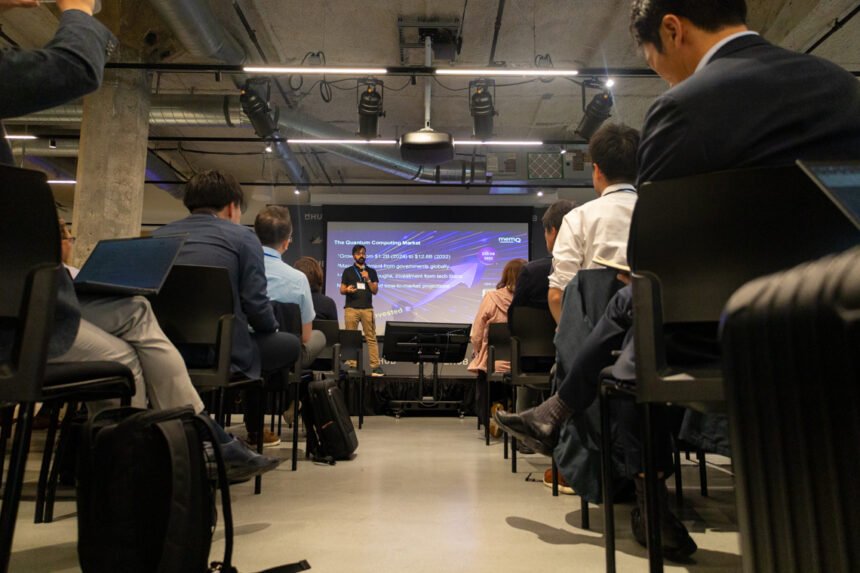CHICAGO — Just over one year ago, the Illinois legislature approved spending more than $700 million to attract and support a new industry: quantum technology.
Now, representatives of other countries, federal research labs and a network of private organizations with ties to the state are beginning to ink deals and make agreements to bring specific quantum companies to Illinois — and boost the startups that are already here.
Illinois state officials are interested in attracting the nascent industry because of its potential for economic growth and positioning Illinois as a high-tech leader in the coming decades.
Quantum technology is an emerging field of research and business that creates specialized machinery and computers that use the laws of quantum mechanics to solve problems and behave in ways that would be out of reach for traditional machines.
Last week, two events in Chicagoland offered a glimpse inside the world of quantum businesses and the layers of public and private funding going into the industry.
The Japan External Trade Organization — an economic development organization affiliated with the government of Japan — sponsored a two-day “delegation” of business representatives to Chicago.
At an early meeting of the delegation, representatives of the state and economic development agencies pitched the region — and Illinois’ state backing — as unique in the world.
“This is not a state government that is following trends but really setting the trends,” Intersect Illinois Chief Quantum Officer Preeti Chalsani told the delegation. “When I go to conferences, I hear about other states and countries who are thinking of doing something like Illinois. That really makes me proud.”
Intersect Illinois is a private nonprofit organization with ties to the state. It’s led by Christy George, a former Pritzker administration official who helped plan the Democratic National Convention in Chicago last summer. The organization also plays a prominent role in the state Department of Commerce and Economic Opportunity’s five-year plan for attracting business to Illinois.
“This is a state that is constantly on a mission to constantly build and expand our business environment,” George said at the event.
Representatives of the Department of Commerce and Economic Opportunity, World Business Chicago and the University of Chicago also participated in the event.
The visit mirrored Gov. JB Pritzker’s and Chicago Mayor Brandon Johnson’s visits to Japan where both men, along with sizable entourages of economic development leaders and businesspeople, met with Japanese officials.
Read more: Federal agency opposes new state law; Pritzker to lead trade mission to Japan
Both visits, and especially Pritzker’s in October 2024, built hype in the Asian nation about Illinois’ role in the developing quantum technology sector. Pritzker is a self-professed “quantum geek” and his personal interest in the emerging industry contributes to the state’s interest in it.
Over the two days the Japanese delegation was in Chicago, they toured several local quantum businesses, including qBraid, InfleQtion, and EeroQ among other locations around the city. The DCEO and Intersect Illinois also hosted a reception for the Japanese delegation.
The efforts from state and industry boosters appear to be interesting to at least a few in the cutting-edge industry.
At a pitch and networking event capping off the Japanese visit last week, several Chicago-based and Japan-based companies discussed their business models and strategies.
One of the Japanese delegation members who pitched at the event, Quantumdata founder Yuki Nagasako, told Capitol News Illinois the quantum industry in Chicago is “very hot,” especially compared to artificial intelligence tech hubs in California.
“When I say I work in quantum technology in the Bay area? Nobody knows. Nothing,” Nagasako said. “But in Chicago, here? Everybody.”
Nagasako, whose company has offices in California and is currently in a fundraising round, said he’s seriously considering expanding in Chicago.
That event also featured a closed-door meetings between Japanese companies and officials at PsiQuantum as well as other local companies.
State quantum park
PsiQuantum is one of the jewels of the state’s quantum crown. It is the “anchor tenant” of the Illinois Quantum and Microelectronics Park, or IQMP, a research park set to break ground later this year on Chicago’s South Side.
The California-based quantum computing company was raising $750 million at a $6 billion valuation earlier this year, according to reporting from Reuters. Its last official valuation was $3.1 billion in 2021.
Read more: Quantum business park coming to Chicago, backed by $700M from state of Illinois
That park is being built with $500 million in state funding, on top of $200 million in tax breaks and other incentives going to PsiQuantum directly.
Harley Johnson, the University of Illinois professor who took over as the head of the IQMP late last year, said the “singular focus” of the research facility is to help scale up quantum computing technology.
“In some cases, it takes really specialized, industrial-scale infrastructure,” Johnson said last week.
Johnson was speaking at an event at Argonne National Lab where federal researchers and state-level quantum advocates discussed the state’s future as the “Quantum Prairie” — a riff on California’s Silicon Valley.
There, he also laid the groundwork for what is expected to be a busy few months at the state’s quantum research park.
“There are a lot of exciting announcements,” Johnson said. “We’re going to break ground very soon.”
In addition to PsiQuantum, several other major groups have said they’ll set up shop at the research park. Six months ago, IBM announced it would build a quantum computer and research center at the park. About a year ago, the Defense Advanced Research Projects Agency, or DARPA, announced it would base a quantum testing program at the park.
Two weeks ago, the IQMP also announced that Australian tech and quantum company Diraq intends to open a facility at the park.
“Diraq building and scaling their quantum operation at the IQMP is a testament to Illinois attracting the tech and security sectors,” Pritzker said in a statement at the time. “Diraq’s commitment further cements Illinois’ position as a global quantum leader and reflects the state’s commitment to fostering innovation and economic growth.”
Diraq is one of nearly 20 companies that is participating in the first stage of DARPA’s quantum testing program.
“We’ve got others that will be coming on board soon,” Johnson said in his speech last week.
Capitol News Illinois is a nonprofit, nonpartisan news service that distributes state government coverage to hundreds of news outlets statewide. It is funded primarily by the Illinois Press Foundation and the Robert R. McCormick Foundation.











